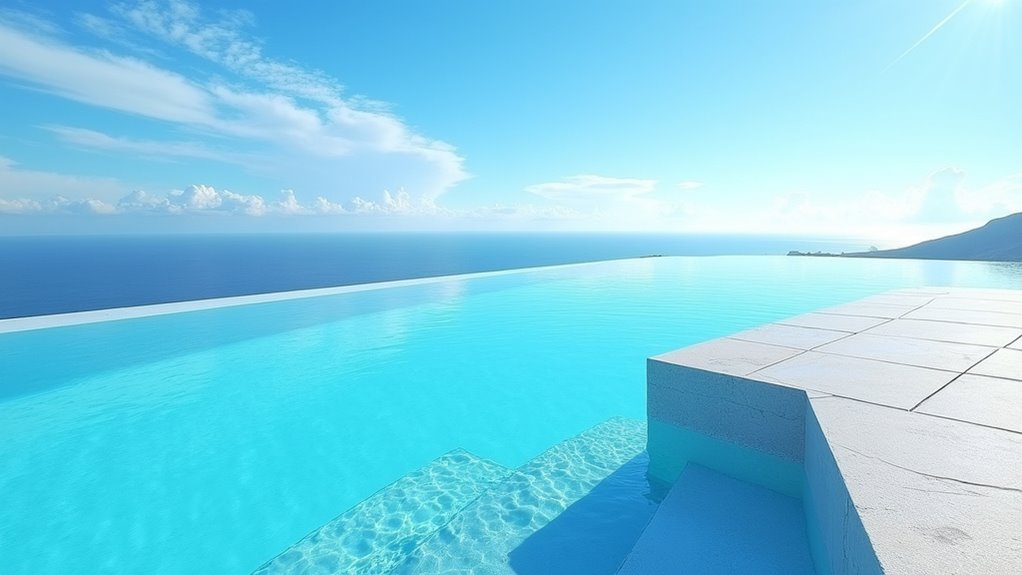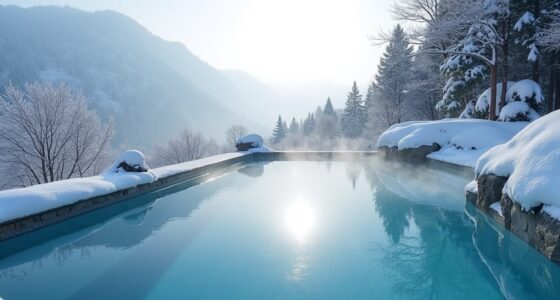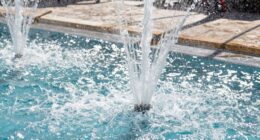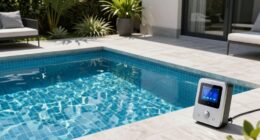In saltwater infinity pools, corrosion is a major concern due to the salty environment, which can damage metals and fixtures over time. To protect your pool, choose corrosion-resistant materials like stainless steel 316, titanium, or durable plastics, and apply special coatings such as epoxy or polyurethane designed for saltwater. Regular maintenance, water chemistry management, and timely repairs help extend your pool’s lifespan. Keep exploring to discover more expert tips for preserving your stunning infinity pool.
Key Takeaways
- Saltwater infinity pools are prone to corrosion of metal components; using marine-grade alloys and protective coatings is essential.
- Epoxy or polyurethane coatings provide a durable barrier against saltwater corrosion, extending pool lifespan.
- Regular maintenance, including water chemistry monitoring and timely repairs, prevents salt-induced damage.
- Selecting corrosion-resistant materials like stainless steel 316 or high-quality plastics minimizes deterioration.
- Proper surface prep, coating application, and routine inspections are key to safeguarding infinity pools from saltwater corrosion.
Understanding the Corrosive Nature of Saltwater Pools
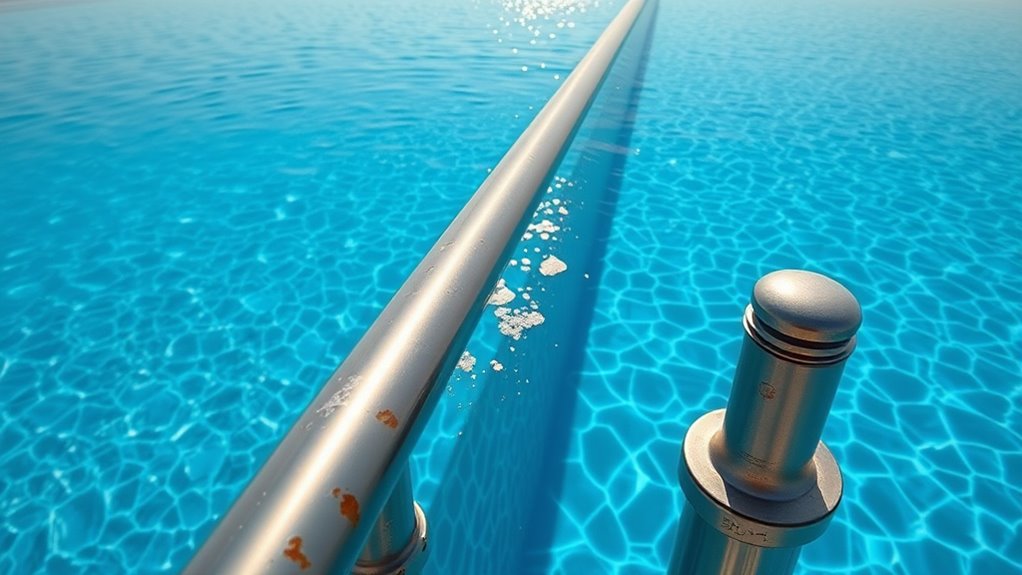
Saltwater pools are often praised for their softer feel and lower chemical needs, but they also come with a significant challenge: corrosion. Understanding saltwater chemistry helps you grasp how salt interacts with pool materials, creating potential damage. When salt dissolves in water, it forms sodium and chloride ions, which can accelerate corrosion along specific pathways. These corrosion pathways include metal fittings, ladders, and pool liners, where saltwater penetrates protective coatings or oxidizes metal surfaces. Continuous exposure causes rust, pitting, and degradation, risking costly repairs. Recognizing how saltwater chemistry influences corrosion pathways empowers you to take preventative measures—like proper material selection and maintenance—to protect your pool’s longevity and structural integrity. Additionally, understanding the effects of salt-induced metal oxidation can guide you in choosing corrosion-resistant materials for your pool components.
Common Materials Vulnerable to Saltwater Damage

While many pool materials are designed to withstand regular use, not all are suitable for saltwater environments. Metals like standard steel and unprotected aluminum are highly vulnerable to corrosion when exposed to saltwater. Even common stainless steel can degrade if it’s not marine grade alloy, which is specially formulated to resist salt-induced damage. Non-metal composites, such as certain plastics and resins, tend to hold up better, but some low-quality options may still deteriorate over time. Wood and other organic materials are also prone to rot and decay in saltwater conditions. If you choose materials that aren’t specifically designed for saltwater exposure, you risk costly repairs and reduced pool lifespan. Always opt for marine grade alloys or durable non-metal composites to ensure longevity. Additionally, understanding the corrosion resistance of pool materials can help in making informed choices for saltwater pools.
Choosing the Right Coatings for Saltwater Infinity Pools
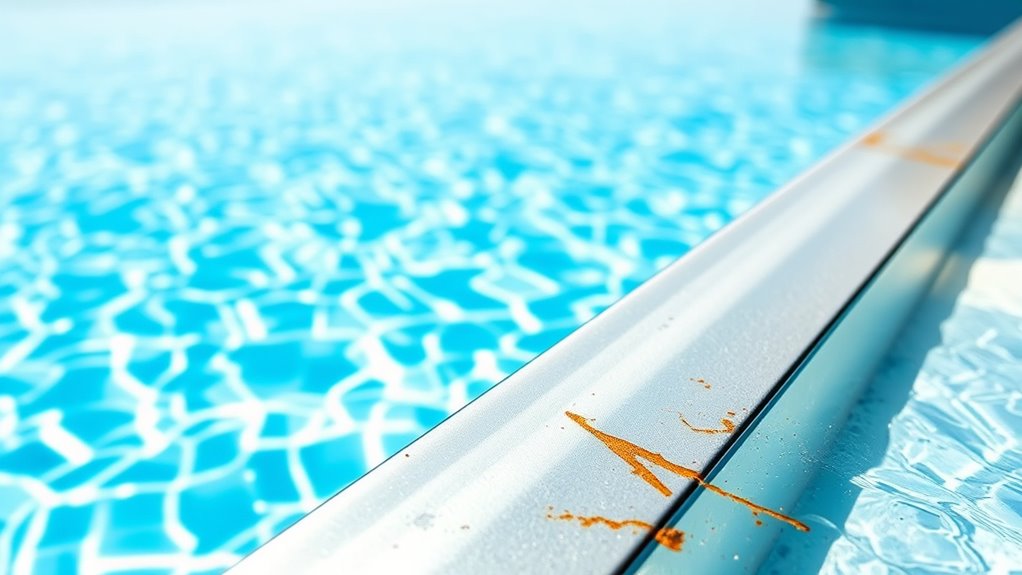
Choosing the right coatings for your saltwater infinity pool is essential to prevent corrosion and damage. You should consider corrosion-resistant materials, effective protective coatings, and how often you’ll need maintenance or reapplication. Making informed choices will help your pool stay beautiful and durable for years to come. Additionally, understanding local climate factors can influence the longevity of your coatings and inform your maintenance schedule.
Corrosion-Resistant Material Options
Selecting the right coatings is essential for guaranteeing your infinity pool withstands the corrosive effects of saltwater. For durable, corrosion-resistant options, consider marine grade alloys like stainless steel or aluminum, which resist rust and deterioration. These alloys are specially formulated to handle harsh salt environments, offering longevity and strength. Additionally, polymer composites provide excellent corrosion resistance and can be customized for specific pool components. They are lightweight, flexible, and resistant to salt-induced damage, making them ideal for various structural and surface applications. Combining these materials with proper coatings enhances their performance, reducing maintenance needs and extending your pool’s lifespan. Corrosion resistance is a key factor to consider when selecting materials for saltwater pools. By choosing marine grade alloys and polymer composites, you guarantee your saltwater infinity pool remains stunning and functional for years to come.
Protective Coating Types
To guarantee your saltwater infinity pool remains protected against corrosion, it’s crucial to choose the right coating types. Consider these options:
- Eco friendly coatings that minimize environmental impact while providing durability.
- UV resistant finishes to prevent fading and degradation from sun exposure.
- Epoxy coatings offering strong adhesion and chemical resistance suitable for saltwater environments.
- Polyurethane coatings for flexibility, UV resistance, and a glossy finish that withstands pool use.
- Incorporating sound healing principles, such as sound vibrations, can promote cellular regeneration and overall health within the pool environment, potentially benefiting swimmers’ well-being.
Selecting the appropriate coating depends on your priorities, like eco-friendliness or prolonged UV resistance. Eco friendly coatings help reduce harmful emissions, while UV resistant finishes extend the lifespan of your pool’s surface. Properly chosen coatings ensure long-lasting protection, maintaining the beauty and integrity of your saltwater infinity pool.
Maintenance and Reapplication
How often you need to maintain and reapply coatings on your saltwater infinity pool depends on several factors, including the type of coating used and exposure to environmental elements. Regular inspections are essential, especially around the pool deck design where wear is most visible. Saltwater chlorination can accelerate coating deterioration, so prompt reapplications help preserve your pool’s beauty and functionality. Additionally, environmental conditions such as humidity and temperature can influence the longevity of coatings, making proper maintenance crucial.
| Coating Type | Reapplication Frequency | Best for |
|---|---|---|
| Epoxy | Every 3-5 years | High durability, salt exposure |
| Polyurethane | Every 2-4 years | Flexibility, UV resistance |
| Sealants | Annually | Surface protection, aesthetics |
Proper maintenance ensures your infinity pool remains stunning and resilient against saltwater corrosion.
Installing Corrosion-Resistant Components and Fixtures

Choosing the right materials is key to preventing corrosion in your saltwater infinity pool. Applying protective coatings and practicing regular maintenance can extend the lifespan of your fixtures. By focusing on these strategies, you guarantee your pool stays beautiful and functional for years to come. Incorporating proper storage solutions can also help protect pool components from environmental damage and prolong their durability.
Material Selection Strategies
When installing components and fixtures for saltwater infinity pools, selecting materials that resist corrosion is essential. Choosing the right materials ensures longevity and minimizes maintenance. Consider these strategies: 1. Use stainless steel alloys like 316-grade for fixtures such as pool lighting and fixtures near aquatic plants. 2. Opt for plastics or composites specifically designed for saltwater environments, reducing rust risk. 3. Select non-corrosive metals like titanium for structural elements exposed to water. 4. Prioritize materials with proven corrosion resistance, such as certain ceramics or coated metals, to protect delicate features. Incorporating rust-resistant materials into your pool design can significantly extend the lifespan of your fixtures and reduce upkeep costs.
Protective Coating Applications
Applying protective coatings is a crucial step in installing corrosion-resistant components and fixtures in saltwater infinity pools. These coatings act as a barrier against the aggressive saltwater chemistry that accelerates corrosion. To guarantee ideal coating durability, select materials specifically formulated for saline environments, such as epoxy or polyurethane coatings. Proper surface preparation, including cleaning and priming, is essential to enhance adhesion and longevity. Applying the coating evenly and thoroughly protects metal fixtures, pipes, and hardware from corrosive effects. Regular inspection of coated components helps identify early signs of wear or damage, allowing for timely touch-ups or reapplication. Incorporating HEPA filtration in your pool environment can also help reduce airborne contaminants that might contribute to corrosion. By prioritizing high-quality coatings designed for saltwater conditions, you markedly extend the lifespan of pool fixtures and preserve the pool’s aesthetic appeal.
Regular Maintenance Practices
To guarantee your saltwater infinity pool remains corrosion-free, regularly inspecting and maintaining your installed components is essential. Proper upkeep involves more than visual checks; it includes proactive measures like:
- Ensuring proper pool chemical balancing to prevent corrosive conditions.
- Replacing or upgrading to corrosion-resistant fixtures and components.
- Using eco-friendly cleaning methods to minimize chemical residues that could harm materials.
- Regularly inspecting for signs of wear, corrosion, or damage, especially on metal parts.
- Being aware that signs of spoilage such as discoloration or mold can indicate compromised materials or water quality that may accelerate corrosion.
Routine Maintenance and Water Chemistry Management
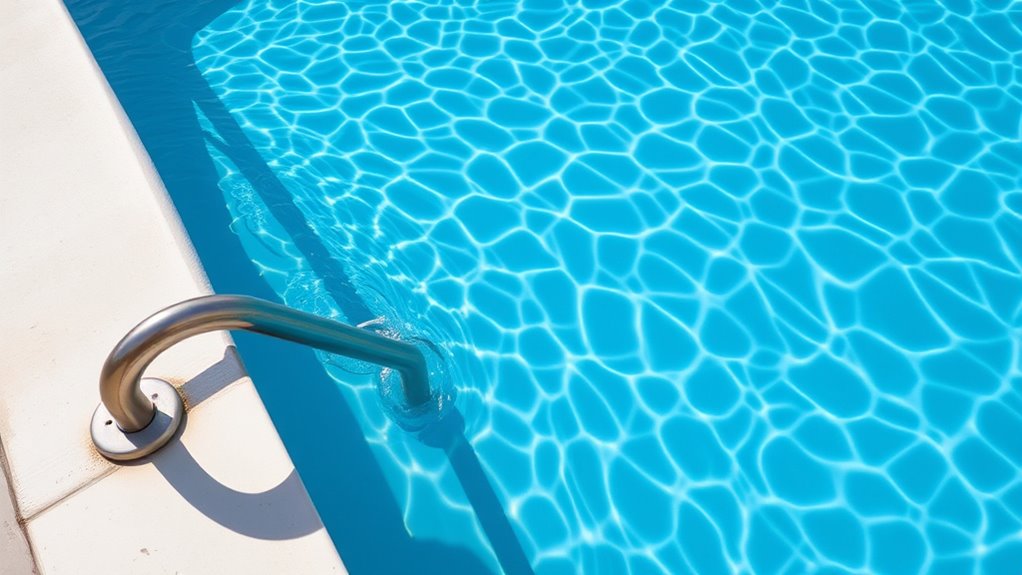
Maintaining the water quality in your saltwater infinity pool requires regular attention to both routine tasks and chemical balance. You need to monitor salt levels, pH, alkalinity, and sanitizer levels consistently to guarantee ideal saltwater chemistry. Use test kits or digital meters to check these parameters weekly, adjusting chemicals as needed to keep the pool water balance stable. Proper balance prevents corrosion and scale buildup on pool surfaces and equipment. Regularly clean skimmers, filters, and probes to prevent debris from skewing test results. Keep an eye on water clarity and ensure proper circulation. By maintaining consistent water chemistry, you’ll help extend your pool’s lifespan, minimize maintenance issues, and guarantee crystal-clear, safe swimming conditions.
Repairing and Replacing Damaged Pool Elements
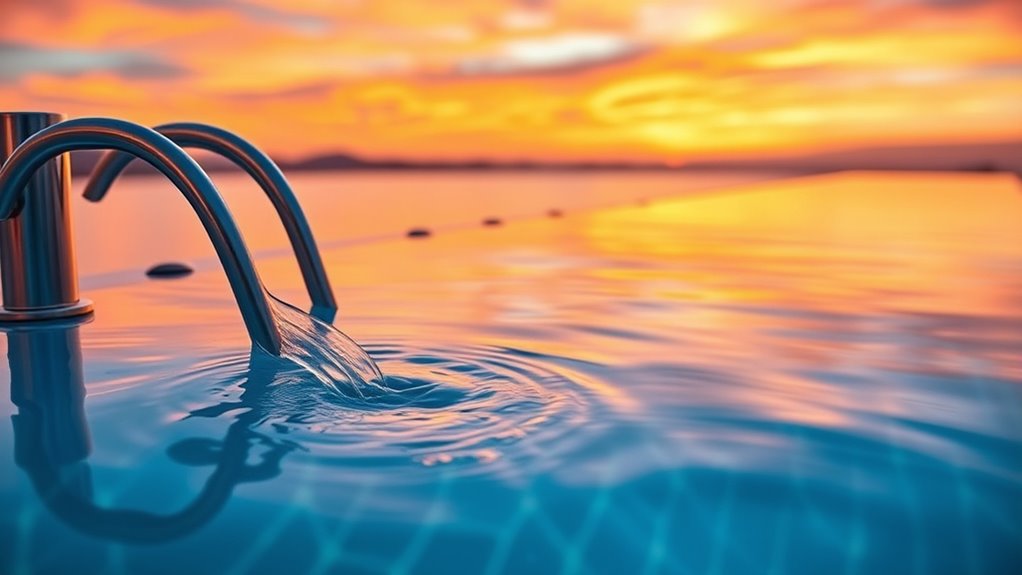
When pool elements become damaged or worn out, addressing the issues promptly guarantees your saltwater infinity pool remains safe and functional. Start by evaluating the damage carefully, checking for corrosion or deterioration caused by improper pool water chemistry or fluctuating salt concentration levels. Then, consider these steps:
- Remove and replace damaged tiles or coping to prevent further deterioration.
- Repair or upgrade corroded metal components with corrosion-resistant materials.
- Replace worn-out or cracked pump parts, ensuring proper salt levels and water chemistry.
- Refinish surfaces if necessary, paying attention to maintaining a balanced salt concentration.
Maintaining ideal pool water chemistry and salt levels is essential during repairs to prevent future damage and extend the lifespan of your pool elements.
Innovative Technologies for Enhanced Corrosion Protection
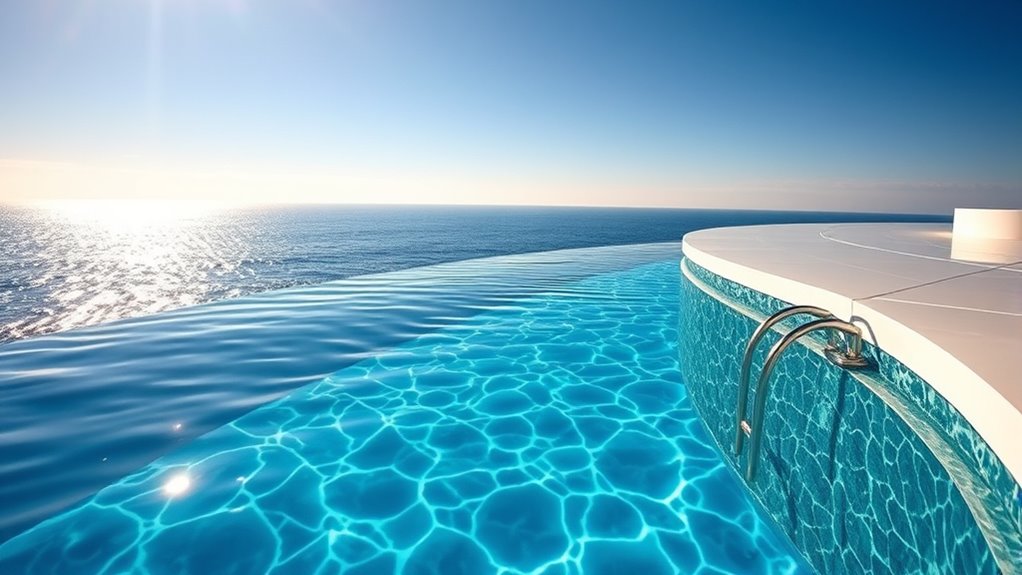
Advances in technology have led to the development of innovative solutions that substantially enhance corrosion protection in saltwater infinity pools. Modern systems now optimize saltwater chemistry, maintaining ideal pH and salinity levels to minimize corrosive effects. Additionally, advanced corrosion barriers, such as specialized coatings and composite materials, provide a robust defense against salt-induced deterioration. These barriers create a protective layer that prevents saltwater from reaching metal surfaces, greatly extending the pool’s lifespan. Smart monitoring devices also help you track salt levels and corrosion risk in real-time, allowing prompt adjustments. By integrating these cutting-edge technologies, you ensure your saltwater infinity pool remains pristine and structurally sound, reducing maintenance costs and preserving its beauty for years to come.
Tips for Long-Term Preservation of Your Pool’s Aesthetic
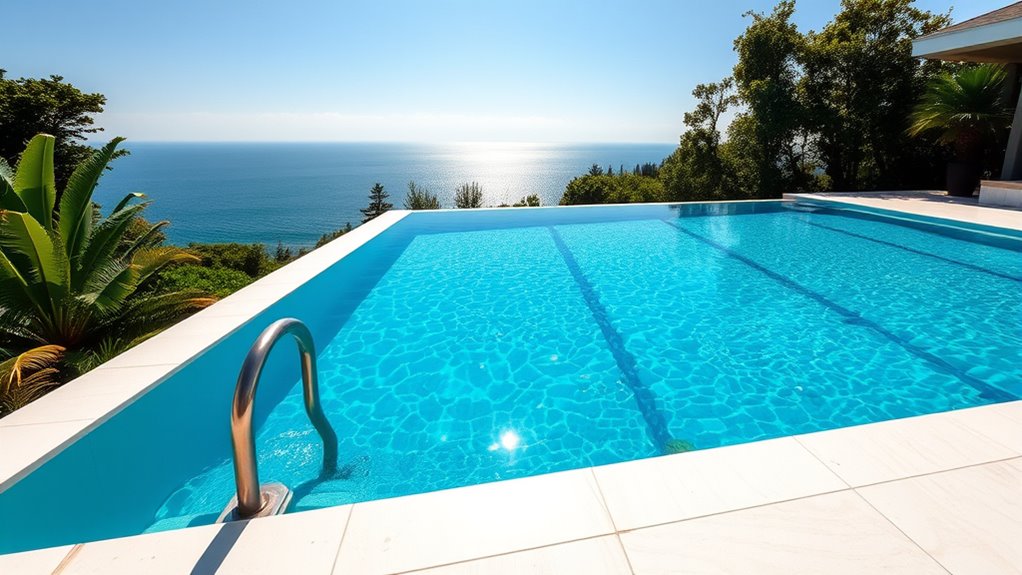
To keep your saltwater infinity pool looking stunning over time, focus on regular cleaning and proper chemical balance. Maintaining saltwater ecology is key to preserving your pool’s aesthetic and preventing algae or mineral buildup. Here are four tips to help:
Regular cleaning and balanced chemicals keep your saltwater infinity pool stunning and algae-free.
- Regularly skim and brush the surface to remove debris and prevent algae growth.
- Monitor and adjust pH, alkalinity, and salt levels to ensure chemical stability.
- Clean filters and skimmers routinely to maintain water clarity.
- Inspect coatings regularly for signs of wear, and reapply protective layers as needed.
Consistent care supports the delicate saltwater ecology, minimizing corrosion and preserving the visual appeal of your pool. Proper maintenance ensures your infinity pool remains a stunning, long-lasting centerpiece.
Professional Services and When to Seek Expert Advice
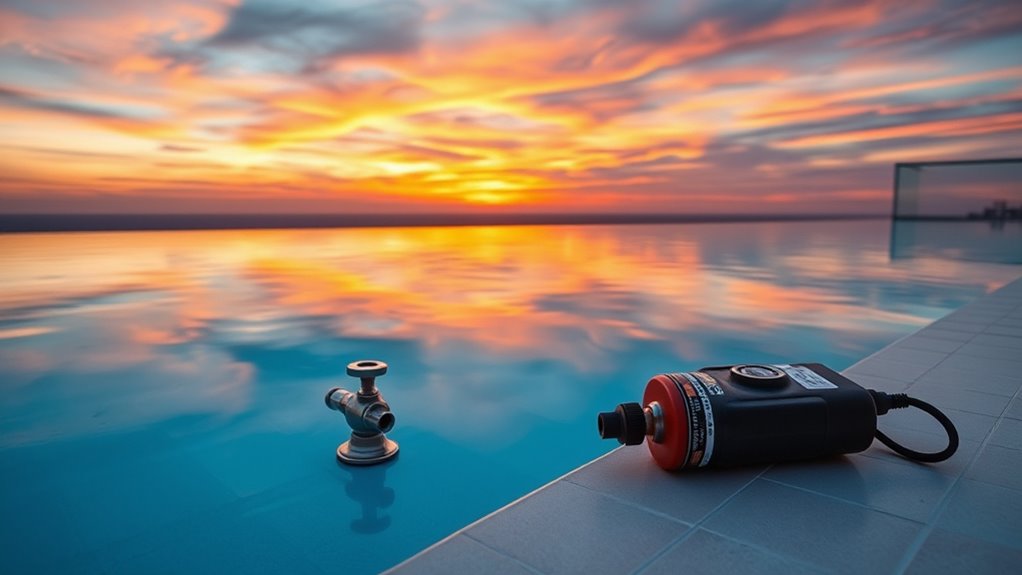
Maintaining a saltwater infinity pool often requires specialized knowledge and equipment, making professional services an essential resource. If you notice persistent issues with pool chemistry, such as imbalanced pH or high chlorine levels, it’s time to consult experts. DIY repairs can sometimes resolve minor problems, like replacing filters or adjusting chemical levels, but complex issues—like corrosion or coating damage—are best handled by professionals. They have the tools and expertise to assess the pool’s condition accurately, ensuring safety and longevity. Seek expert advice whenever you’re unsure about chemical balance, equipment malfunction, or signs of corrosion. Regular professional inspections can prevent costly repairs down the line and keep your saltwater infinity pool functioning smoothly and looking pristine.
Frequently Asked Questions
How Does Saltwater Affect the Pool’s Surrounding Landscape and Decking?
Saltwater can cause your surrounding landscape to experience erosion over time, especially if it’s not properly protected. It may also lead to decking discoloration, making the surface look dull or stained. You should regularly clean and seal your decking and landscape elements to prevent damage. Using corrosion-resistant materials and adding protective coatings helps minimize saltwater’s effects, keeping your pool area looking attractive and well-maintained.
Are There Eco-Friendly Options for Saltwater Pool Coatings?
You might worry eco-friendly coatings aren’t durable enough, but many options now use sustainable materials that protect your pool effectively. Look for eco-friendly coatings designed with environmentally conscious ingredients, like plant-based or mineral-based compounds. These sustainable materials provide a long-lasting barrier against corrosion while minimizing environmental impact. By choosing these coatings, you support eco-conscious practices without sacrificing performance, ensuring your saltwater infinity pool stays beautiful and sustainable for years to come.
What Are Signs of Early Corrosion in Saltwater Infinity Pools?
You should watch for early signs of corrosion, like metal staining on pool surfaces or fixtures, which often appear as discoloration or spots. A pool pH imbalance can accelerate corrosion, so regularly test and adjust your pH levels. If you notice cloudy water, rough spots on the pool lining, or unexplained rust, address these issues promptly, as they indicate your saltwater infinity pool is beginning to corrode.
Can Natural Remedies Help Prolong the Lifespan of Pool Components?
You bet natural remedies can massively boost your pool’s longevity! Using things like vinegar and baking soda isn’t just for cleaning; they can help prevent corrosion and damage, giving your pool components a much longer life. These natural remedies are eco-friendly, affordable, and surprisingly effective. By incorporating them into your routine, you’re giving your saltwater infinity pool a fighting chance against corrosion and keeping it sparkling for years to come!
How Does Climate Impact Saltwater Pool Maintenance and Corrosion?
Climate variations markedly impact your saltwater pool maintenance and corrosion control. Hot, humid weather accelerates corrosion, making regular upkeep essential. Cold climates can cause freezing issues, requiring winterization. You’ll face maintenance challenges like balancing chemicals and protecting pool components from weather-related wear. To keep your pool in top shape, adjust your maintenance routine based on your climate, stay vigilant for corrosion signs, and consider protective coatings to minimize damage.
Conclusion
To keep your saltwater infinity pool pristine, you must treat it like a delicate symphony—each element playing its part in harmony. By understanding the corrosive nature of saltwater, choosing the right materials, and performing regular maintenance, you guarantee your oasis remains stunning and functional. Remember, neglect is the silent thief of beauty; stay vigilant, and your paradise will stand strong against time’s relentless march. After all, beauty is only preserved through mindful care.
